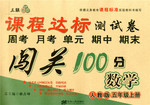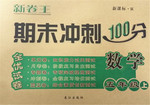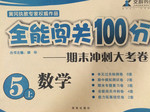
—How did she get infected?
—She ____ the viruses without any protection.
|
A.exposed to |
B.had exposed to |
C.was exposed to |
D.has exposed to |
 课程达标测试卷闯关100分系列答案
课程达标测试卷闯关100分系列答案 新卷王期末冲刺100分系列答案
新卷王期末冲刺100分系列答案 全能闯关100分系列答案
全能闯关100分系列答案科目:高中英语 来源:2014届辽宁沈阳同泽女中高二下学期期中考试英语卷(解析版) 题型:完型填空
Dahlia was running around the house screaming and crying. “I hate her! I hate her! I will __36__ play with her again!” Finally, her steps slowed, __37__ she told her father what had happened. He listened attentively. __38__ she stopped, he asked, “Is there __39__ else?” Dahlia added more details and began __40__ bitterly again. Father was listening. When Dahlia __41__ talking, he said, “It must __42__ you to be made fun of like this by your best friend Tina.” Dahlia __43__ her father’s embrace(拥抱)and support as she cried __44__ more in his arms. Then as __45__ as the storm of tears began, she was finished. She got up and __46__ announced, “Daddy, did you know that tomorrow Tina and I are going together to the beach? We are __47__ a log house there with Adam and Tom, I will tell Tina before we go that I __48__ ruin her work again, and I’m sure she will be __49__ to me. ”
Why was this encounter (sudden meeting) so successful? How did Dahlia __50__ her sadness so completely and realize her responsibility in the matter __51__ her own?
There were three main parts in her father’s reaction that __52__ : (A) Attention (B) Respect (C) Trust. He gave his daughter __53__ attention and took her seriously as she __54__ her feelings. He respected her by not coming with words of wisdom, advice or help. He validated(证实)the feelings she __55__ . And he trusted her to do and say what she needed in order to lead herself toward resolution of her emotions.
1. A.hardly B.seldom C.ever D.never
2. A.so B.but C.and D.then
3. A.Before B.When C.While D.Since
4. A.something B.anything C.everything D.nothing
5. A.crying B.running C.talking D.saying
6. A.kept B.started C.stopped D.hated
7. A.hurt B.ache C.injure D.wound
8. A.got B.received C.accepted D.admitted
9. A.many B.some C.any D.no
10. A.soon B.quickly C.suddenly D.fast
11. A.surprisingly B.angrily C.sadly D.cheerfully
12. A.building B.buying C.making D.repairing
13. A.shouldn’t B.won’t C.daren’t D.can’t
14. A.polite B.cruel C.rude D.nice
15. A.get over B.get away C.get along D.get through
16. A.for B.on C.by D.in
17. A.did B.followed C.went D.worked
18. A.full B.incomplete C.half D.undivided
19. A.sent out B.threw out C.put out D.poured out
20. A.expressed B.showed C.said D.strengthened
查看答案和解析>>
科目:高中英语 来源:2015届山东省济宁市高一上学期期末考试英语试卷(解析版) 题型:阅读理解
My friend, Emma Daniels, spent the summer of 1974 traveling in Israel. During her month-long stay in Jerusalem she often went to a café called Chocolate Soup. It was run by two men, one of whom—Alex—used to live in Montreal. One morning when Emma went in for coffee, while chatting with her new friend Alex, she mentioned that she had just finished the book she was reading and had nothing else to read. Alex said he had a wonderful book she might like, and that he’d be happy to lend it to her. As he lived just above the café, he quickly ran up to get it. The book he handed to Emma just minutes later was Markings, a book by a former Secretary— General of the United Nations (UN).
Emma had never read it, nor had she ever bought a copy. But, when she opened it up, she was floored to see her own name and address inside the cover in her own handwriting. It turned out that the summer before, at a concert back in Montreal, Emma had met a Californian who was in town visiting friends. They decided to exchange addresses, but neither of them had any paper. The man opened up a book he was carrying in his backpack(背包) and asked Emma to write her name and address inside. When he returned to California, he left the book behind in Montreal, and his friend Alex kept it. When Alex later moved to Jerusalem, he took the book along.
1.Alex lent Emma the book, Markings, .
A.to show his friendliness to her
B.to show his interest in reading
C.to tell her about the importance of the UN
D.to let her write her name and address inside
2.How did Emma feel the moment she opened the book?
A.Pleased. B.Satisfied C.Worried. D.Surprised.
3.We can learn from the text that the Californian .
A.met Emma at a concert B.invited Emma to a concert
C.introduced Emma to his friend D.left Emma his backpack
4.Who was supposed to be the first owner of the book?
A.An official of the UN. B.A coffee shop owner.
C.A friend of the author’s. D.Alex’s friend from California.
查看答案和解析>>
科目:高中英语 来源:2015届山东省济宁市高一3月质量检测英语试卷(解析版) 题型:阅读理解
Every day we experience one of the wonders of the world around us without even realizing it. It is not the amazing complexity of television, nor the impressive technology of transport. The universal wonder we share and experience is our ability to make noise with our mouths, and so transmit ideas and thoughts to each other’s minds. This ability comes so naturally that we tend to forget what a miracle it is.
Obviously, the ability to talk is something that marks humans off from animal. Of course, some animals have powers just as amazing, Birds can fly thousands miles by observing positions of the stars in the sky in relation to the time of day and year. In Nature’s talent show, humans are a species of animal that have developed their own special act. If we reduce it to basic terms, it’s an ability for communicating information to others, by varying sounds we make as we breathe out.
Not that we don’t have other powers of communication. Our facial expressions convey our emotions, such as anger, or joy, or disappointment. The way we hold our heads can indicate to others whether we are happy or sad. This is so-called “body language”. Bristling(直立的) fur is an unmistakable warning of attack among many animals. Similarly, the bowed head or drooping tail shows a readiness to take second place in any animal gathering.
Such a means of communication is a basic mechanism that animals, including human beings, instinctively acquire and display. Is the ability to speak just another sort of instinct? If so, how did human beings acquire this amazing skill? Biologist can readily indicate that particular area of our brain where speech mechanisms function, but this doesn’t tell us how that part of our bodies originated in our biological history.
1.According to the passage, the wonder we take for granted(认为理所当然) is________.
A.our ability to use language
B.the miracle of technology
C.the amazing power of nature
D.our ability to make noises with mouth
2.What feature of “body language” mentioned in the passage is common to both human and animals?
A.Lifting heads when sad.
B.Keeping long faces when angry.
C.Bristling hair when ready to attack.
D.Bowing heads when willing to obey.
3.What can be inferred from Paragraph 3?
A.Body language is unique to humans.
B.Animals express emotions just as humans do.
C.Humans have other powers of communication.
D.Humans are no different from animals to some degree.
4.This passage is mainly about _______.
A.the development of body language.
B.the special role humans play in nature
C.the power to convey information to others
D.the difference between humans and animals in language use
查看答案和解析>>
科目:高中英语 来源:2012-2013学年江西南昌10所重点中学高三第二次模拟突破冲刺(三)英语试卷(解析版) 题型:阅读理解
Anyone who ever wondered why a dying plant, say, a freshly-cut red rose may appeal to a lady friend, might take some comfort in science, which once again offers us a reasonable answer to one of the world’ s great mysteries.
Beyond a common preference in people for blue, “the long history of color preference studies has been described as ‘confusing and contradictory(矛盾的)’,” write scientists Anya Hurlbert and Yazhu Ling of England’ s Newcastle University, authors of a new study in the journal Current Biology. “This fact is perhaps surprising,” they said, “though the popularity of the concept that little girls differ from boys in preferring pink.”
But the scientists believe they have an answer to this scientific mystery, discovering women’s preference for red, hidden above the average liking for blue.
In their study, the pair quickly flashed color cards, displaying many different aspects, at 208 volunteers, mostly Britishers but with a number of Han Chinese, who moved to the United Kingdom recently. Tested in three different experiments, the researchers found out a small but significant preference for reddish colors in the female volunteers.
Puzzled, the authors realized that most of the difference between men and women came in the form of a preference for green VS red in the color cards, regardless of the other slight differences such as the slightly blue ones that everyone liked. Why might this be?
Evolution might offer an answer, they reason. Human color perception(感知), the assessment of three separate color types — red — green — blue— in our vision (视觉) is a relatively recent addition to our line of mammals(脯乳动物)
Adding weight to their argument, they found the women who are most typically feminine(女性的) on a psychological survey also had the biggest preference for reddish colors. “My love is like a red, red rose,” wrote the Scottish poet Rober Burns in 1794.
1.What does the first paragraph probably tell us ?
A.Scientific research can help people solve the mystery.
B.When we are tired, we can turn to science for help.
C.Science can make our study interesting and contradictory.
D.We should turn to scientific invention for comfortable life.
2.The word “pair” in Para.4 refers to _____.
A.boy and girl B.the two authors
C.research and result D.pink and blue
3.According to the passage, ______________.
A.boys like blue better than girls
B.girls like pink better than boys
C.men like red better than women
D.men and women both like green
4.How did the scientist do the research?
A.By asking questions B.By telephoning the interviewees
C.By adding numbers D.By doing experiments
5.What is the purpose of writing this article?
A.To sell products packed in red B.To introduce the history of color
C.To inform us of a research finding D.To analyze men’s taste for color
查看答案和解析>>
科目:高中英语 来源:2014届吉林省高二上学期期末考试英语试卷(解析版) 题型:阅读理解
In June 2008,Benita Grist was driving in her hometown of Mississauga as a passenger in the car ahead threw a paper cup out of the window.When Grist horned to express her displeasure, the passenger responded by throwing out a bag.
Instead of annoyed, she decided to do something about it.She organized a one woman litter?awareness campaign.She started small,chatting with her neighbors about litter—and asking them to be more conscious of any tendencies they might have to litter.Soon,she noticed local families, kids and all—picking up litter around their homes.”I thought,that’s all it took—for me to open my mouth?” she says.”So I decided to knock on more doors.”
And she didn’t stop there.She approached people on the street,in malls,even in the waiting room before getting an X ray. Grist often started her appeal with something such as,”I hope you don’t think I’m crazy,but...” Yet she was buoyed by the positive response—so much so that in August 2008, she began to contact officials in various levels of government, companies and other institutions in an effort to reach a wider audience.
Through a local Mac’s Convenience Store,Grist managed to contact the company that produces content displayed on their in store monitors.That led to a public service announcement about litter that ran in almost 600 Mac’s stores in Ontario from November 2008 to June 2009. Grist continues to explore every opportunity she has to get the message out.Her grassroots campaign may be different,but she has begun to open people’s eyes about the problem of litter.And thanks to her efforts,in Mississauga,at least,they have begun to do just that.
1.How did Benita Grist start her campaign?
A.She chatted with her neighbors. B.She quarreled with a stranger.
C.She went door to door,talking. D.She talked to patients in hospital.
2.The underlined word “buoyed” in Paragraph 4 probably means “-------”.
A.inspired B.discouraged C.confused D.disturbed
3.What’s the main idea of the passage?
A.Introduction to a one woman litter awareness campaign.
B.How Benita Started the one woman litter awareness campaign.
C.Why Benita Started the one woman litter awareness campaign.
D.Benita and the one woman litter awareness campaign.
查看答案和解析>>
湖北省互联网违法和不良信息举报平台 | 网上有害信息举报专区 | 电信诈骗举报专区 | 涉历史虚无主义有害信息举报专区 | 涉企侵权举报专区
违法和不良信息举报电话:027-86699610 举报邮箱:58377363@163.com